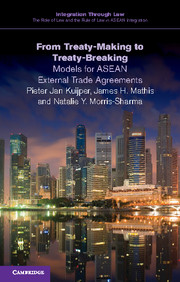Book contents
- Frontmatter
- Contents
- General editors' preface
- List of abbreviations
- 1 Introduction
- 2 Substantive components of an ASEAN trade agreement from an external perspective
- 3 Moving forward: different institutional models for ASEAN's external trade agreements
- 4 The rules on dispute settlement in agreements between ASEAN member states and third states: a critical inventory
- 5 From treaty-making to treaty-breaking
- Executive summary
- Appendix 1 Agreements signed by ASEAN member states with a non-ASEAN party
- Appendix 2 ‘Non-ASEAN’ agreements
- References
- Index
5 - From treaty-making to treaty-breaking
Published online by Cambridge University Press: 05 April 2015
- Frontmatter
- Contents
- General editors' preface
- List of abbreviations
- 1 Introduction
- 2 Substantive components of an ASEAN trade agreement from an external perspective
- 3 Moving forward: different institutional models for ASEAN's external trade agreements
- 4 The rules on dispute settlement in agreements between ASEAN member states and third states: a critical inventory
- 5 From treaty-making to treaty-breaking
- Executive summary
- Appendix 1 Agreements signed by ASEAN member states with a non-ASEAN party
- Appendix 2 ‘Non-ASEAN’ agreements
- References
- Index
Summary
Introduction
As noted in our opening introduction, achieving a clear view of what this research yields is possible only if the different models of agreements and their implications are traced through all stages of the treaty-making to treaty-breaking succession, from,
representation of the organisation and authorisation to negotiate; negotiation mandate and then negotiation, normally terminated by initialling the draft text; then signature and/or conclusion, followed by implementation; monitoring of implementation; complaints and initiation of dispute settlement; dispute settlement; responsibility; implementation and, if necessary, enforcement of dispute settlement results; achievement of final settlement. Monitoring the implementation of an agreement forms the middle point of this continuum. It is part of treaty-making in that, if monitoring is successful, the agreement is truly implemented and fulfilling its function. Monitoring can also be the beginning of treaty-breaking, if it reveals deficient or faulty implementation.
In Chapter 2, the characteristics of substantive regulatory and trade policies most likely to be raised in future ASEAN external agreements were examined. It also demarcated the terrain of the subject matter into its hard and soft law aspects. Chapter 3 set out the detailed existing and possible future forms of agreement for ASEAN and its members and the impact of these on aspects of treaty-making, including who could be the parties to the agreement and undertake obligations under the agreement, how the agreement could be negotiated, and how the agreement could enter into force. Chapter 4 followed with a consideration of the implications of these different agreements for dispute settlement aspects. With the different forms of agreements in mind, this chapter will go on to take the substantive policies and the dispute settlement issues in turn through the treaty-making and treaty-breaking process.
Substantive regulatory and trade provisions
This section places the policies raised in Chapter 2 in the context of treaty-making, implementation and breaking. Two perspectives are adopted. The first looks at the hard law subject areas and considers what those provisions suggest for ASEAN in the treaty process.
- Type
- Chapter
- Information
- From Treaty-Making to Treaty-BreakingModels for ASEAN External Trade Agreements, pp. 197 - 215Publisher: Cambridge University PressPrint publication year: 2015

